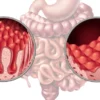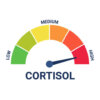
Introduction
If you’re suffering from symptoms like bloating and abdominal pain, it’s common to be looking for the cause. While these symptoms can often be described as IBS, a possible cause can be an alteration in the balance of the gut microbiome. This may involve an overgrowth of bacteria in the small intestine.
This overgrowth, known as small intestinal bacterial overgrowth (SIBO) has been linked with IBS. Some studies have found SIBO to be present in up to 78% of those with IBS. [Source: PubMed]
But how does SIBO affect digestive health?
And can SIBO cause gastritis? Let’s explore these questions and more below.
What is SIBO?
SIBO stands for small intestinal bacterial overgrowth, a condition that involves a higher level of bacteria in the small intestine than should typically be present. The result of this excessive level of bacteria can be many of the symptoms typically seen in IBS.
These symptoms bloating, abdominal pain, food reactions, as well as constipation or diarrhoea. [Source: PubMed]
These symptoms can often come about either due to excess gas being produced in the small intestine or in the large intestine. This can depend on the severity of malabsorption or malformation taking place in the digestive system. [Source: PubMed]
What causes SIBO?
SIBO is a bacterial overgrowth in the small intestine. This is an overgrowth of bacteria in a place where typically there should be a low level of organisms.
Factors that increase the risk of developing SIBO include:
- Age
- Female sex
- Medications (PPIs and opioids)
- Dyspepsia
- Intestinal dysmotility
- Low-grade inflammation
- Small bowel diverticula
- Abdominal surgery
- Diabetes
- Hypothyroidism
- Pancreatitis
- Parkinson’s disease [Source: PubMed]
Rather than seeing SIBO as an infection in the small intestine, the development of the onset of SIBO can be viewed in another way.
This involves a change in the ecosystem in the small intestine, which then leads to an environment that is more hospitable to bacteria.
For example, a low-grade inflammatory response in the small intestine can increase the presence of oxygen in the bowel, which allows for less beneficial bacteria to overgrow. [Source: PubMed]
When treating SIBO, considering and addressing these underlying factors can be a crucial part of a successful treatment.
SIBO and gastritis are both digestive conditions, but they impact different parts of the gut.
Gastritis is a condition that involves inflammation of the stomach lining. This can lead to symptoms of pain and discomfort as well as nausea.
SIBO on the other hand, is a bacterial overgrowth in the small intestine. This leads to malabsorption of nutrients as well as common symptoms such as bloating and diarrhoea.
While both SIBO and gastritis are related conditions, and they’re not one and the same thing, there may be a crossover in symptoms such as abdominal pain as well as nausea. [Source: PubMed]
Even though these are separate conditions, studies have found that those with IBS and SIBO also usually suffer from gastritis. This may be due to the same factors taking place in the small intestine also occurring in the stomach. [Source: PubMed]
These factors may involve:
- Low-grade inflammation
- Immune activation [Source: PubMed]
- Visceral hypersensitivity [Source: PubMed]
Can SIBO cause stomach inflammation?
It has not been found that SIBO directly leads to stomach inflammation. However, it may be very likely that the same factors that lead to SIBO also have the potential to lead to gastritis.
These factors can include:
- High levels of alcohol use
- Medications
- Food allergies
- Food poisoning (low-grade inflammation)
- Infections [Source: UCONN]
While the most common infection that leads to gastritis is H Pylori, this does not lead to SIBO. However, infections such as Giardia may impact the small intestine and contribute to the development of SIBO. [Source: PubMed]
Does SIBO damage the gut lining?
SIBO can damage the gut lining and cause inflammation in the gut. This inflammatory response in the gut lining may then worsen or increase the typical symptoms of SIBO.
This may be seen in the form of microscopic inflammation in the small intestine. This is not something that is tested routinely when assessing for SIBO or IBS.
SIBO can also lead to increased permeability of the gut lining, which is also referred to as leaky gut. [Source: BMJ]
Not only is increased permeability of the gut lining associated with IBS and IBD, but also non-digestive conditions such as diabetes, heart disease, and obesity. [Source: PubMed]
Does SIBO cause high stomach acid?
SIBO may not cause high stomach acid but the presence of SIBO can increase the risk of reflux and heartburn.
A 2021 study reported that over 60% of those with heartburn who were taking PPI medications had SIBO or some form or bacterial imbalance in the small intestine. This may be due to the long-term use of PPI medications leading to changes in the gut bacteria.
However, even those without SIBO were reported to have an increased presence of reflux, heartburn, and regurgitation. [Source: PubMed]
What is gastritis?
Gastritis is inflammation of the stomach lining, and it can be caused by various. One of the most common is an infection with the bacteria, Helicobacter pylori (H. pylori). The bacteria sticks to and irritates the lining of the stomach, leading to pain, nausea, dyspepsia, and heartburn. [Source: PubMed]
H Pylori is also a common cause of duodenal (a section of the small intestine) ulcers. [Source: PubMed]
Other factors such as the use of anti-inflammatory medications, alcohol intake, and stress have all been linked to an increased risk of developing gastritis. [Source: PubMed, PubMed]
Natural SIBO Treatment
Natural approaches to treat SIBO are aimed at not only lowering the bacterial load in the small intestine but also working to address an underlying issue.
For some patients with SIBO, probiotics alone can address the issues in the small intestine, leading to a resolution in symptoms. This can be due to the way in which probiotics interact with the body and stimulate the natural production of antimicrobial compounds in the gut, thus lowering the levels of bacteria. [Source: PubMed]
Herbal antimicrobials have also been found to be an effective treatment in addressing SIBO. Specific doses of key herbs can be used include:
- Thyme
- Oregano
- Lemon balm
- Berberine
- Sage
- Chinese rhubarb
- Coptis [Source: PubMed]
Along with working to lower the bacterial load in the small intestine, it is important to consider other aspects contributing to the initial overgrowth.
As mentioned in this article already, this can include factors such as hypothyroidism, low-grade inflammation, or food intolerances.
your system–and this includes your stomach lining!
Also Read: SIBO Tongue – What Is It & What Does It Mean?
Do you fart a lot with SIBO?
If you are experiencing excessive flatulence, abdominal pain distention, and diarrhoea, it could be a sign that you have SIBO. This can be due to the excess gas produced in the intestines as a result of malfermentation. [Source: PubMed]
It’s also possible for people with SIBO to experience nausea and vomiting as well as bloating. [Source: PubMed]
Can IBS be mistaken for SIBO?
Often IBS can be mistaken for SIBO. Both conditions have similar signs and symptoms.
IBS is considered a diagnosis of exclusion; this means that a doctor will rule out other possible causes before giving an IBS diagnosis. This rules out conditions such as coeliac disease and inflammatory bowel conditions such as Crohn’s disease. However, SIBO can be tested with a specific breath test.
What can often be true is that SIBO is the actual root cause of IBS, therefore providing a specific approach to addressing the cause of the symptoms. [Source: PubMed]
Can omeprazole cause SIBO?
PPI medications, which include omeprazole, ezomeprazole, lansoprazole, are prescribed to address conditions such as heartburn and reflux by reducing the secretion of stomach acid.
It has been reported that the use of these medications can lead to changes in the gut microbiome, both in the balance of the organisms as well as the diversity. This is understood to be due to the reduction of gastric acid, which is meant to be present in adequate levels to keep certain organisms at the appropriate levels.
It is also possible for these medications to adjust and alter the immune response in the gut, which can further contribute to imbalances in the gut bacteria.
These medications can contribute to bacterial overgrowth, such as SIBO. This can be due to the factors outlined above, but also due to the use of PPI medications increasing the individual’s susceptibility to gastric infections such as C difcile and Salmonella. Gastric infections are considered a significant risk for developing SIBO. Therefore this is another possible explanation for the increased risk of developing SIBO with the use of PPI medications such as omeprazole. [Source: PubMed]
What underlying condition causes SIBO?
SIBO can be caused by a number of underlying conditions.
These underlying aspects can fall into 1 of 3 categories:
- Structural abnormalities
- Motility abnormalities
- Biochemical abnormalities
Structural Abnormalities
- Small bowel diverticula
- Blind intestinal loops
- Adhesions, strictures
- Ileocecal valve impairment
Motility Abnormalities
- Medications (opiates, anticholinergics)
- Gastroparesis
- Connective tissue disease (e.g., scleroderma)
Biochemical Abnormalities
- Chronic pancreatitis
- Hypochlorhydria (e.g., PPI use, atrophic gastritis)
- Common variable immunodeficiency
If one of these conditions has been diagnosed or is present, it’s important to take this into consideration when addressing a gut condition such as SIBO. [Source: PubMed]
Conclusion
SIBO can cause irritation or damage to the gut lining. While common symptoms of SIBO are bloating and food reactions, it’s not uncommon for heartburn and reflux to also be present.
While these are different to gastritis, due to the location of these symptoms, it may be common for these to be a crossover in how they are described.
However, in cases of SIBO as well as gastritis, the overview of the approach is similar. This involves working to address the underlying factors involved in causing symptoms rather than suppressing them with medications or restrictive diets.
Working with a gut health nutritional therapist is a key way that this can be approached.






